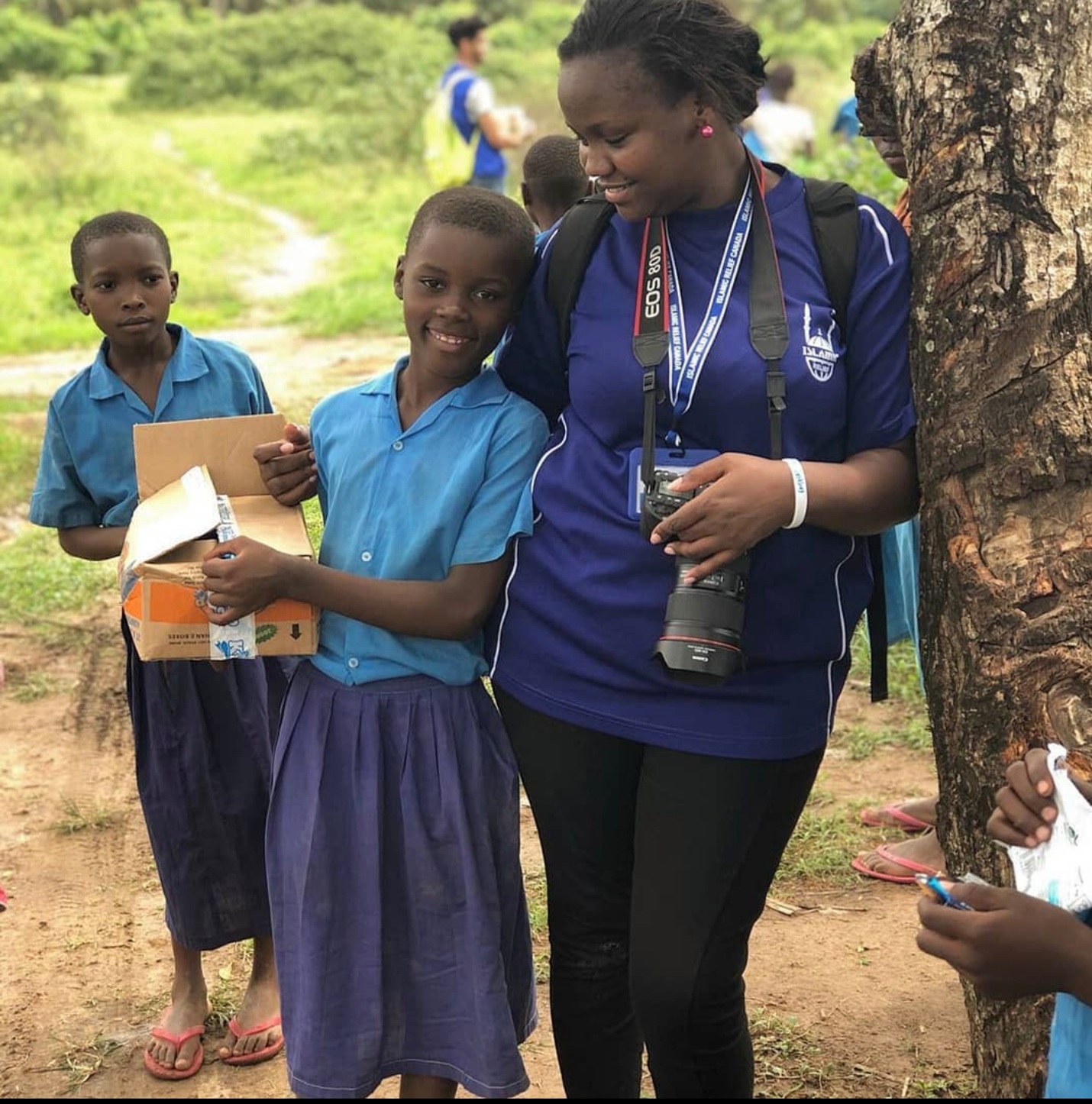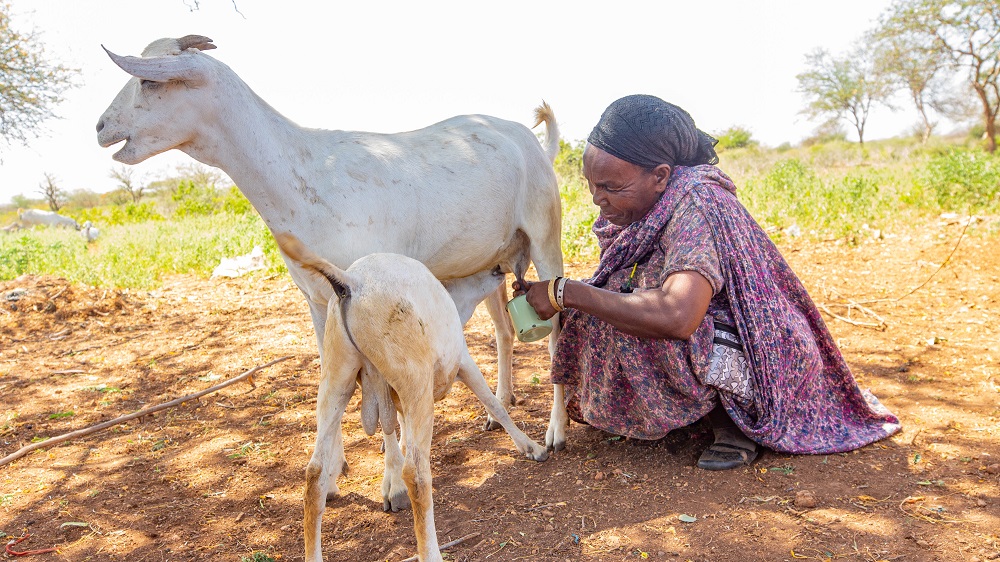The theme of this year’s World Humanitarian Day is #TheHumanRace, highlighting the race against time to beat climate change and the immediate consequences for the world’s most vulnerable people. In the race against the climate crisis, we can’t leave anyone behind.
Gloria Nthenya Kivuva, who works for Islamic Relief Worldwide in East Africa, reflects here on the changes she has seen due to climate change and her hopes for the future.

Climate change has become a reality of today and tomorrow. On August 19, the thirteenth-year commemorating World Humanitarian Day, I cannot help but reflect on the human cost of climate change.
Worldwide, the number of people at risk has been growing for decade.
According to a report by The International Federation of Red Cross and Red Crescent Societies, since the 1990s there has been an increase of almost 35 per cent in the average number of climate and weather-related disasters per decade. A staggering 83 per cent of all disasters in the last 10 years were caused by extreme weather events such as floods, storms and heatwaves. Over 410,000 people have lost their lives, while an incredible 1.7 billion people have been affected.
On the frontlines of climate change in East Africa
Working for Islamic Relief in East Africa, I have witnessed first-hand the devastating impact of extreme weather events here in Kenya, where I live and work.
A country once abundant in savannah, highlands, lakes and rivers, Kenya’s natural wealth of resources is depleting as weather patterns change. We are now experiencing prolonged colder weather, unreliable rainfall and higher temperatures.
It is a constant state of crisis as emergency follows emergency.
Communities in Kenya’s north and coastal regions experience sweltering heat as temperatures reach 400C and drought, followed by flash floods and erratic rainfall. Competition for limited natural resources frequently results in conflict. And, in 2020, an outbreak of locust swarms also ravaged crops and vegetation.
A matter of life and death
Climate change is a matter of life and death for vulnerable people. Loss of livelihoods and homes, crop failure, dried up riverbeds, displacement and communities pushed to the brink of starvation is all too familiar, fuelling poverty and conflict. Farmers are faced with the heart-breaking dilemma whether to feed themselves or their livestock, often choosing the latter.
The voices of those who have suffered echo in my ears.
In the heart of the country’s arid region is Mandera, located at the border of Somalia and Kenya. The majority of families are farmers who depend on animals for their livelihood. While on my first field visit to Mandera, I met with Mohamed and his scrawny livestock herd.
He had lost goats and was determined to search for pasture and water for his remaining animals. Unable to walk, he used his remaining savings to hire a vehicle to transport his frail animals to a watering spot in the hope that his livelihood could be saved until the next rainy season.
The harrowing cry of the resistant camels in search of water at a watering hole filled the air.
In Wajir County, community members were quick to show me a giraffe carcass stuck in a hole that had been dug near a borehole with no watering trough, evidence of its struggle to quench its thirst.
In Kilifi County at the Kenyan coast, River Sabaki broke its banks following heavy rainfall leaving hundreds of families homeless and camping at the Garashi Chief’s Camp. The raging floods swept away herds of animals and crops ready for harvesting resulting in a humanitarian crisis with thousands of people in dire need of relief food, shelter, clean water and sanitation facilities.
The people of Garashi are still unable to grow crops as sand was heavily deposited on their farms.

Climate action involves local solutions using modern techniques
Islamic Relief is working closely with communities to help them adapt to the changes caused by increasingly extreme weather events. We use green energy to boost access clean water, food security, livelihoods and improved access to education to lift communities out of poverty.
Since 2018, Islamic Relief has worked with the Moyale Sub-County Department of Agriculture, Livestock and Fisheries to promote food production in Dabel. Solar-powered irrigation facilities were installed. We set up farmer groups and trained them to adapt their farming methods to climate change. Some 300 farmers also received assorted drought-resistant seeds and farm tools.
The community was introduced to diversification of sources of income to adapt to the long-term challenge of climate change. They are now growing various types of crops for eating and selling, and producing high-quality honey. In a restocking initiative, Galla goats – a hardy breed – were introduced, resulting in multiplied herds of drought resistant goats, providing children with nutritious milk, and more to sell.
Climate action must be inclusive
Women bear higher poverty and food insecurity levels during disasters because of their limited or lack of control over assets. To ensure the initiatives we deliver are sustainable, we prioritise marginalised groups. Islamic Relief recognises young people’s and women’s roles in climate action. Our projects empower women to take part in decision-making.
More efforts towards disaster risk reduction
The climate emergency is worsening at an alarming rate and the least deserving bear the greatest brunt. To reduce the impact of the disasters on vulnerable people, humanitarian responses such as early warning systems must be launched before any anticipated extreme weather events.
Communities in Kenya continue to display resilience when empowered with resources and knowledge. They remain steadfast in their faith and commitment to improve their living conditions despite the competition for dwindling natural resources.
A race against the clock
My hope is renewed by the many stories of resilience, increased income and overall improved family livelihoods. But our communities deserve more significant action towards poverty eradication, reduction of carbon footprint and actions to mitigate further destruction of our climate by those with a tremendous responsibility for the climate breakdown.
The human toll of climate change is too high.
Compassion, custodianship and social justice afford us the responsibility to accelerate and intensify the actions needed for a low carbon future and ensure that everyone in the world has access to their basic needs – as a minimum.
Islamic Relief works on the frontlines of climate change, providing lifesaving and life-changing support in vulnerable communities, and campaigns for bold action to tackle the climate emergency. This World Humanitarian Day, we pay tribute to our dedicated colleagues and supporters who make possible this work. With your support, we can do more: please donate today.










